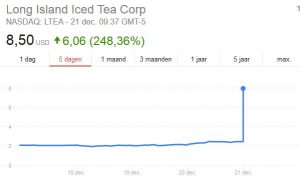Een jaar geleden zette Marc Coucke zijn vijf favoriete aandelen voor 2017 op Twitter.
Hoe heeft zijn portefeuille gepresteerd in 2017?
Mithra Pharmaceuticals: +16,6%
Smartphoto: +0,6%
Ter Beke: +26,0%
Lotus Bakeries: -15,4%
Fagron: +14,7%
(De getoonde rendementen vergelijken de slotkoers van 22 december 2017 met die van 29 december 2016.)
In de veronderstelling dat je Coucke’s favorieten zou gekocht hebben, dan ben je nu 8,5% rijker (zonder rekening te houden met kosten en dividenden).
===
Ik heb een boek over banken en geld geschreven. Lezers vinden het een aanrader!


